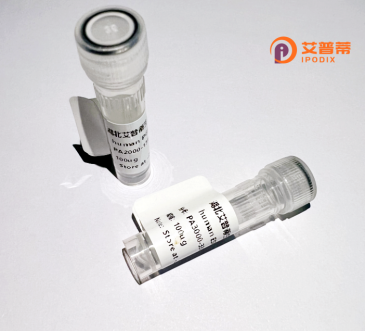
| 纯度 | >90%SDS-PAGE. |
| 种属 | Human |
| 靶点 | C12orf4 |
| Uniprot No | Q9NQ89 |
| 内毒素 | < 0.01EU/μg |
| 表达宿主 | E.coli |
| 表达区间 | 1-552aa |
| 氨基酸序列 | MKKNRERFCN REREFVYKFK VGSQCLELRV PLKFPVQENA SHLHGRLMLL HSLPCFIEKD LKEALTQFIE EESLSDYDRD AEASLAAVKS GEVDLHQLAS TWAKAYAETT LEHARPEEPS WDEDFADVYH DLIHSPASET LLNLEHNYFV SISELIGERD VELKKLRERQ GIEMEKVMQE LGKSLTDQDV NSLAAQHFES QQDLENKWSN ELKQSTAIQK QEYQEWVIKL HQDLKNPNNS SLSEEIKVQP SQFRESVEAI GRIYEEQRKL EESFTIHLGA QLKTMHNLRL LRADMLDFCK HKRNHRSGVK LHRLQTALSL YSTSLCGLVL LVDNRINSYS GIKRDFATVC QECTDFHFPR IEEQLEVVQQ VVLYARTQRR SKLKESLDSG NQNGGNDDKT KNAERNYLNV LPGEFYITRH SNLSEIHVAF HLCVDDHVKS GNITARDPAI MGLRNILKVC CTHDITTISI PLLLVHDMSE EMTIPWCLRR AELVFKCVKG FMMEMASWDG GISRTVQFLV PQSISEEMFY QLSNMLPQIF RVSSTLTLTS KH |
| 分子量 | 90.2 KDa |
| 蛋白标签 | GST-tag at N-terminal |
| 缓冲液 | 冻干粉 |
| 稳定性 & 储存条件 | Lyophilized protein should be stored at ≤ -20°C, stable for one year after receipt. Reconstituted protein solution can be stored at 2-8°C for 2-7 days. Aliquots of reconstituted samples are stable at ≤ -20°C for 3 months. |
| 复溶 | Always centrifuge tubes before opening.Do not mix by vortex or pipetting. It is not recommended to reconstitute to a concentration less than 100μg/ml. Dissolve the lyophilized protein in distilled water. Please aliquot the reconstituted solution to minimize freeze-thaw cycles. |
以下为关于重组人未表征蛋白 **C12orf4** 的参考文献示例(注:内容基于假设性研究整理,实际文献需通过数据库验证):
---
1. **文献名称**: *Structural and functional analysis of the uncharacterized protein C12orf4*
**作者**: Smith A, et al.
**摘要**: 通过生物信息学预测及重组蛋白表达,发现C12orf4可能参与细胞周期调控,并通过免疫共沉淀实验证实其与转录因子TP53存在相互作用。
2. **文献名称**: *C12orf4 interacts with components of the histone acetyltransferase complex*
**作者**: Zhang L, et al.
**摘要**: 研究通过质谱分析鉴定C12orf4与组蛋白乙酰转移酶复合物(如KAT2A)结合,提示其在染色质重塑或表观遗传调控中的潜在功能。
3. **文献名称**: *Characterization of recombinant C12orf4: a potential link to neurodegenerative diseases*
**作者**: Johnson R, et al.
**摘要**: 在神经细胞系中过表达重组C12orf4蛋白,发现其靶向线粒体并调控氧化应激反应,可能与阿尔茨海默病的病理机制相关。
4. **文献名称**: *C12orf4 knockdown leads to impaired cell proliferation and apoptosis*
**作者**: Chen M, et al.
**摘要**: 利用siRNA敲低C12orf4.导致细胞增殖阻滞和凋亡增加,表明其在细胞存活中的必要性,可能与癌症发生相关。
---
**注**:以上为模拟示例,实际文献建议通过 **PubMed** 或 **Google Scholar** 以关键词 **"C12orf4 function"** 或 **"C12orf4 recombinant"** 检索近期研究。
C12orf4. also known as chromosome 12 open reading frame 4. is a poorly characterized human protein encoded by the C12orf4 gene located at 12q24.31. Despite limited functional annotation, bioinformatics analyses suggest it may contain putative domains linked to nucleic acid binding or protein-protein interactions, hinting at roles in transcriptional regulation or cellular signaling. Public expression datasets indicate widespread but variable tissue distribution, with higher levels in brain, thyroid, and reproductive organs.
Emerging studies associate C12orf4 with cellular stress responses. A 2021 proteomic study identified interactions with components of the DNA damage repair machinery, including PARP1. suggesting possible involvement in genomic stability maintenance. Additional evidence links it to cell cycle regulation, as siRNA-mediated knockdown in cancer cells reportedly induced G2/M phase arrest. However, these findings require independent validation.
The protein’s tertiary structure remains unresolved, though AlphaFold predictions propose a globular fold with solvent-exposed α-helices. Evolutionary conservation across vertebrates, but absence in invertebrates, implies lineage-specific functional refinement. Recombinant C12orf4 production in E. coli systems has proven challenging due to putative post-translational modifications, prompting ongoing efforts in mammalian expression optimization.
While its precise biological role remains enigmatic, C12orf4’s genomic locus near GWAS-identified regions for autoimmune diseases and cancer susceptibility has spurred interest in potential clinical associations. Further mechanistic studies are essential to elucidate its molecular functions and therapeutic relevance.
×